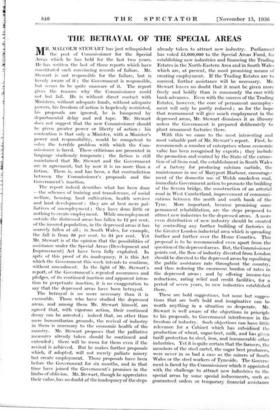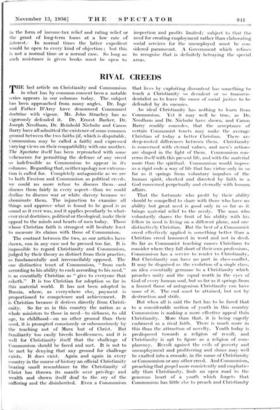THE BETRAYAL OF THE SPECIAL AREAS M R. MALCOLM STEWART has
just relinquished the post of Commissioner for the Special Areas which he has held for the last two years. He has written the last of those reports which have constituted such convincing records of failure. Mr. Stewart is not responsible for the failure, but is keenly aware of it ; the Government is responsible, but seems to be quite unaware of it. The report gives the reasons why the Commissioner could not but fail. He is without direct contact with Ministers, without adequate funds, without adequate powers, his freedom of action is hopelessly restricted, his proposals are ignored, he is hampered by departmental delay and red tape. Mr. Stewart does not suggest that the new Commissioner should be given greater power or liberty of action : his contention is that only a Minister, with a Minister's power and responsibility, would be competent to solve the terrible problem with which the Com- missioner is faced. These criticisms are presented in language studiously temperate ; the fiction is still maintained that Mr. Stewart and the Government are in agreement, but by now it is no more than a fiction. There is, and has been, a flat contradiction between the Commissioner's proposals and the Government's inaction.
The report indeed describes what has been done —the schemes of training and transference, of social welfare, housing, land cultivation, health services and land development : they arc at best mere pal- liatives of unemployment ; they have done little or nothing to create employment. While unemployment outside the distressed areas has fallen to 12 per cent. of the insured population, in the depressed areas it has scarcely fallen at all ; in South Wales, for example, the fall is from 38 per cent. to 34 per cent. Yet Mr. Stewart is of the opinion that the possibilities of assistance under the Special Areas (Development and Improvement) Act have been fully exploited. In spite of this proof of its inadequacy, it is this Act which the Government this week intends to continue, without amendment. In the light of Mr. Stewart's report, of the Government's repeated assurances and pledges, of its continued inaction and apparent inten- tion to perpetuate inaction, it is no exaggeration to say that the depressed areas have been betrayed.
The betrayal is no more necessary than it is excusable. Those who have studied the depressed areas, and among them Mr. Stewart himself, are agreed that, with vigorous action, their continued decay can be arrested ; indeed that, on other than mere humanitarian grounds, the revival of industry in them is necessary to the economic health of the country. Mr. Stewart proposes that the palliative measures already taken should be continued and extended ; there will be room for them even if the revival is achieved. But he makes further proposals which, if adopted, will not merely palliate misery but create employment. Those proposals have been before the Government for six months, and in that time have joined the Government's promises in the limbo of oblivion. Mr. Stewart, though he appreciates their value, has no doubt of the inadequacy of the steps already taken to attract new industry. Parliament has voted £5,000,000 to the Special Areas Fund, for establishing new industries and financing the Trading Estates in the North-Eastern Area and in South Wales which are, at present, the most promising means of creating employment. If the Trading Estates are to succeed, further assistance will be necessary. Mr. Stewart leaves no doubt that it must be. given more freely and boldly than is commonly the case with bank advances. Even with the success of the Trading Estates, however, the core of permanent unemploy- ment will only be partly reduced ; as for the hope that rearmament will give much employment in the depressed areas, Mr. Stewart dismisses it as illusory unless the Government is prepared deliberately to plant armament factories there.
With this we came to the most interesting and most valuable part of Mr. Stewart's report. First, he recommends a number of enterprises whose economic value has been recognised by experts ; they include the promotion and control by the State of the extrac- tion of oil from coal, the establishment in South Wales of a factory for producing calcium carbide, the maintenance in use of Maryport Harbour, encourage- ment of the domestic use of Welsh smokeless coal, immediate Government action to promote the building of the Severn bridge, the construction of an arterial road in West Cumberland, improvement of communi- cations between the north and south bank of the Tyne. More important, because promising some permanent rehabilitation, are the steps proposed to attract new industries to the depressed areas. A more even distribution of new industry should be created by controlling any further building of factories in the Greater London industrial area which is spreading further and further over the Home counties, This proposal is to be recommended even apart from the question of the depressed areas. But, the Commissioner points out, the flow of industry diverted from London should-be directed to the depressed areas by equalising the public assistance rate throughout the country, and thus reducing the enormous burden of rates in the depressed areas ; and. by offering income-tax reductions, rating relief and credit facilities, for a period of seven years, to new industries established there.
These are bold suggestions, but none but sugges- tions that are both bold and imaginative can be worth anything in a situation so desperate. Mr. Stewart is well aware of the objections in principle to his proposals, to Government interference in the freedom of industry. Such objections can have little relevance for a Cabinet which has subsidised the production of wheat, sugar-beet, milk, and has given tariff protection to steel, iron, and innumerable other . industries. Yet it is quite certain that the farmers, the members of the steel cartel, the sugar beet producers, were never in so bad a case as the miners of South Wales or the steel workers of Tyneside. The Govern- ment is faced by the Conunissioner which it appointed with the challenge to attract new industries to the special areas by some special inducements, such as guaranteed. orders or temporary finaneial .assistance in the form of income-tax relief and rating relief or the grant of long-term loans at a -low rate of interest., In normal times the latter expedient would be open to every kind of objection ; but this is not a normal time or a normal case. So long as such assistance is given books must be open to inspection and profits limited; subject to that the need'for creating employment rather than elaborating social services for the unemployed must be cou• sidered paramount. A Government which refuses to recognise that is definitely betraying the special areas.















































 Previous page
Previous page